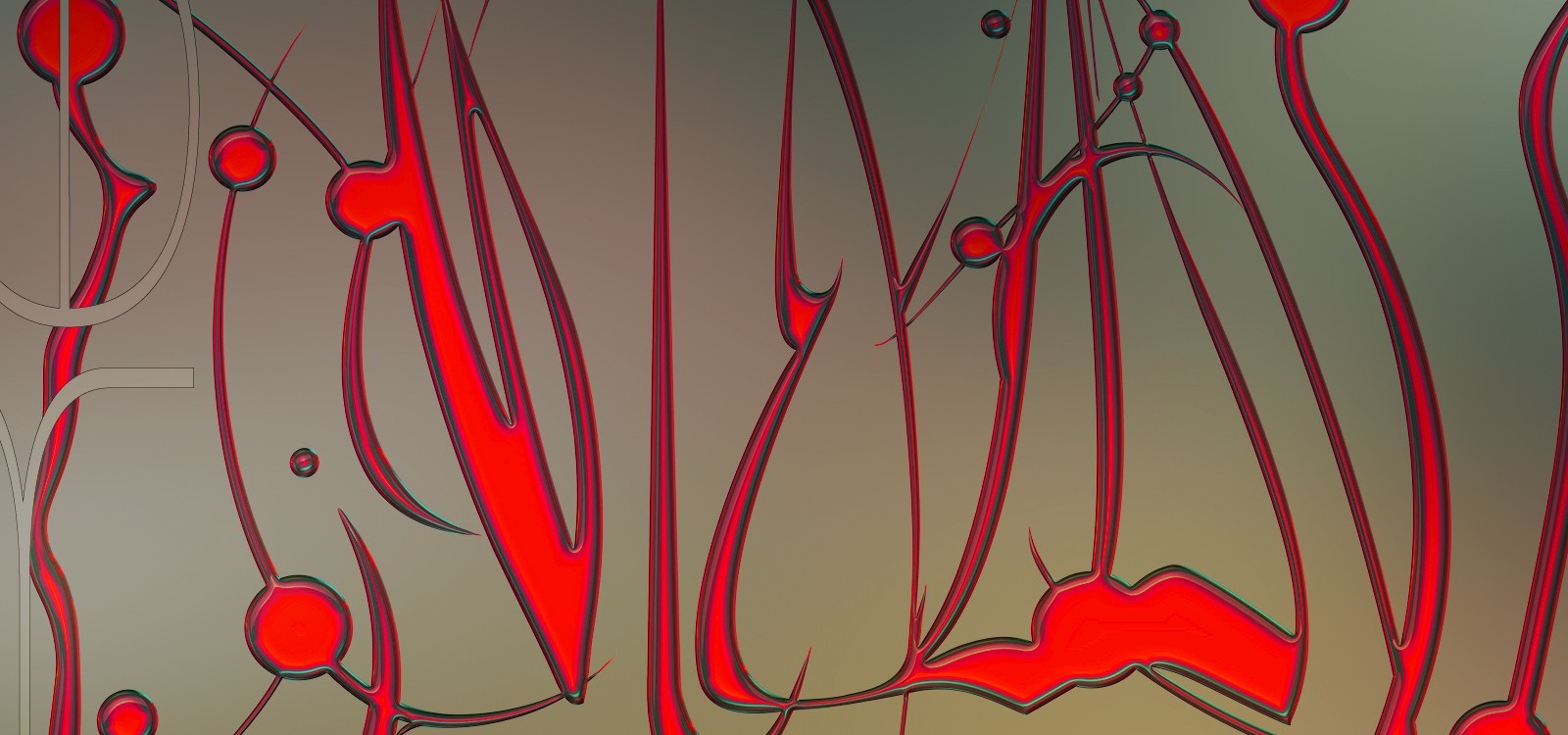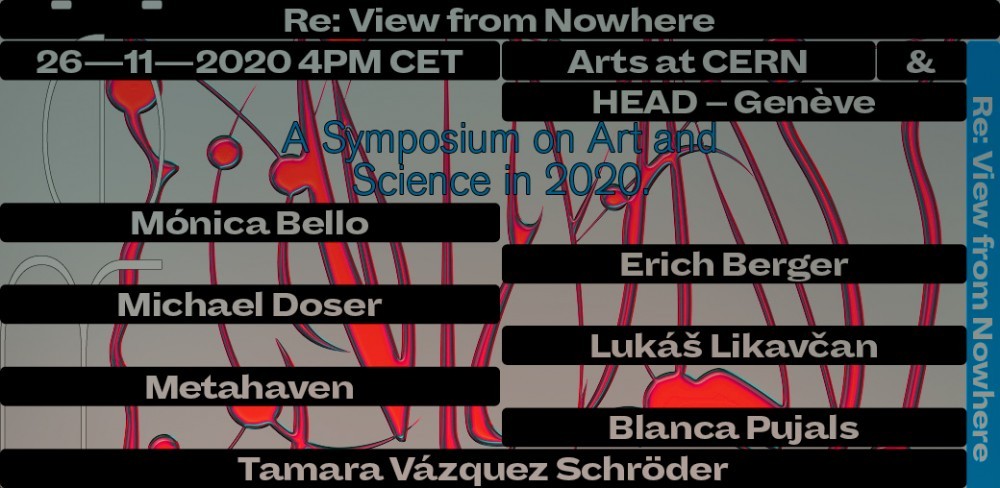
Re: View from Nowhere. A Symposium on Art and Science in 2020
Organized jointly by Arts at CERN, HEAD Genève and Metahaven, the symposium Re: View from Nowhere is interested in the way in which physics, 'the science in which we have achieved our greatest detachment from a specifically human perspective on the world', might inform, inspire or flow towards the practices of art, design, and filmmaking.
26 November 2020, 4PM CET/10AM EST. Register here
CERN, the European Laboratory for Particle Physics, was founded in Geneva in 1954 in a spirit of internationalism and multilateralism. In the context of this event, it will serve as a framework to consider new cross-pollinations between science and art.
While science and art engage with a broad variety of questions, they can be considered related through curiosity and perseverance shared by both scientists and artists. Both fields depend on what anthropologist Anna Tsing calls the “arts of noticing”: attentiveness to transformative encounters. Art and science both work from questions that are rarely experienced quite as urgently by others than those asking the question. Science probes into the texture of raw, un-narrated reality, while the obscurity and patchiness of creative processes don’t make for elegance or smoothness. Any discoveries and findings for both science and art are shorthand for everything that still remains unknown.
In spite of these analogies, there are also differences between science and art, the ways their practitioners think, sketch, create and discover, and the way their processes and results are communicated and discussed.
In Re: View from Nowhere, artists and researchers from a variety of backgrounds will not make any attempt to hide their differences in approach and vocabulary. Instead, they will engage in circulation, between science and art, of a more unfiltered form of insight. By facing the very limits of the possibility of dialogue, the event hopes to foster an unsmooth context for new exchanges.
SPEAKERS:
Mónica Bello is a Spanish curator and art historian. In her curatorial work, she focuses on the narratives of today’s techno-scientific culture and the way artists instigate new conversations around emergent cultural phenomena, such as the role of science and new knowledge in the perception of reality. Since 2015 she holds the position of Curator & Head of Arts at CERN at the European Organization for Nuclear Research in Geneva. In this role, she curates the research-led artistic residencies at the Laboratory and the new art commissions that reflect on the exchanges between artists and scientists at CERN. She has curated the exhibition Quantum that is currently in tour in different art institutions in Europe since 2018. She was the Guest Curator of Audemars Piguet Art Commission for Art Basel 2018. Prior to her arrival to Geneva, she held the position of Artistic Director of VIDA (2010-2015) at Fundación Telefónica, Madrid, a pioneering award that explored cross-cultural expressions around the notion of life. She initiated and ran (2007-2010) the Department of Education at Laboral Centro de Arte, Gijón (Spain). She has curated exhibitions and events across Europe, and internationally with artists, designers, scientists and theorists across disciplines. Bello is a regular speaker at conferences and participates in selection committees, advisory boards and mentorship programs.
Erich Berger is an artist, curator and cultural worker based in Helsinki, Finland. His focus is on the intersection of art, science and technology with a critical take on how they transform society and the world at large. Throughout his practice he has explored the materiality of information, and information and technology as artistic material. Berger's current interest in issues of deep time and hybrid ecology led him to work with geological processes, radiogenic phenomena and their socio-political implications in the here and now. He moves between visual arts and science in an area, which he also investigates and develops as director of the Bioart Society in Helsinki. His installations, performances and interfaces are exhibited widely and he received awards from renowned institutions such as Prix Ars Electronica (AT), ZKM (DE), Vida Telefónica (ES), and Files Prix (BR).
http://randomseed.org
Michael Doser is a senior research physicist at CERN in Geneva, and he is the spokesperson of the AEgIS experiment and editor of Physics Letters B and of the Review of Particle Properties. He specializes in working with antimatter – the formation of anti-atoms, study of matter-antimatter asymmetry, measurement of the gravitational interaction between matter and antimatter-, using it either as a tool or as an object of study itself. He was a founder member of the cultural board for Arts at Cern (2011-2014), lectures to a wide spectrum of audiences, from school children to decision-makers, and he is involved in numerous outreach activities, including art-related events, both locally and internationally.
Lukáš Likavčan is a researcher and theorist, writing on philosophy of technology, political ecology and visual cultures. He teaches at Center for Audiovisual Studies FAMU (Prague), and Strelka Institute for Media, Architecture and Design (Moscow). Likavčan is also a collaborator of the Digital Earth fellowship programme (digitalearth.art), a member of Display – Association for Research and Collective Practice (Prague), and an author of Introduction to Comparative Planetology (Strelka Press, 2019).
The work of Metahaven consists of filmmaking, writing, and design. Films by Metahaven include The Sprawl (Propaganda about Propaganda) (2015), Information Skies (2016, nominated for the 2017 European Film Awards), Hometown (2018), and Eurasia (Questions on Happiness) (2018). Solo exhibitions include Turnarounds, e-flux, New York (2019), Version History, ICA London (2018), Earth, Stedelijk Museum Amsterdam (2018), Hometown, Izolyatsia, Kyiv (2018), Information Skies, Auto Italia, London (2016), The Sprawl, Yerba Buena Center for the Arts, San Francisco (2015), and Islands in the Cloud, MoMA PS1, New York (2013). Group exhibitions include Ghost:2651, Bangkok (2018), the Busan Biennale (2018), the Sharjah Biennial (2017), the Gwangju Biennale (2016), Private Settings: Art after the Internet, Warsaw Museum of Modern Art (2014), and Frozen Lakes, Artists Space, New York (2013). Recent lectures include “An Evening with Metahaven,” the Museum of Modern Art, New York (2019), “After The Sprawl,” Castello di Rivoli, Turin (2019), and “Inhabitant,” Harvard GSD, Cambridge (2020). Recent publications include PSYOP: An Anthology (Koenig Books, London, 2018, co-edited with Karen Archey), and Digital Tarkovsky (Strelka Press, Moscow, 2018).
Blanca Pujals is an architect, spatial researcher and critical writer. Her cross-disciplinary practice is based on spatial research and critical analysis to engage with questions of contemporary culture, philosophy of science and transnational politics, developing tools for undertaking analysis through different visual and sonic devices. Her work encompasses film, architecture, lecturing, curatorial projects, teaching and critical writing. She got her BA in Architecture at Barcelona School of Architecture. She completed her studies with a MA in Critical Theory and Museum Studies at the Independent Studies Program of MACBA Museum, tutored by the philosopher Paul B.Preciado. She was recently a postgraduate at the Centre for Research Architecture (Visual Cultures Department) at Goldsmiths University of London, directed by Susan Schuppli and Eyal Weizman. She is currently developing her practice-led PhD in Arts and Sciences, about the geopolitics and spatial articulations of the fundamental sciences infrastructures.
Tamara Vázquez Schröder is an experimental particle physicist working with the ATLAS experiment. She joined the ATLAS Collaboration in 2010 as a PhD student with the University of Goettingen, and as a post-doc with McGill University until 2018 and as a CERN Research Fellow until mid-2020. Since August 2020, she is a CERN Research LD Staff member. Her research focuses on measurements and searches of physics processes involving top quarks, Higgs boson and new particles. She has been involved in various Arts at CERN projects and events such as the workshop 'Thinking Alleys' by Cassandre Poirier Simon - inspired by hybrid narrative systems -, and the project 'Space Time Energy’ with Julie Lang and Anne Sylvie Henchoz. She was a guest speaker at the 'Science meets fiction' conference at HEAD in October 2019. Previously she collaborated with various literature and art and science projects, such as the interview “Artists on the loose at the Large Hadron Collider” by Natasha Mitchell for the Radio Program Science Friction, ABC Radio National, Australian Broadcasting Corporation, July 2019; a contribution to the post “The elementary bestiary” in the CCCB blog, originally written in Spanish and translated into Catalan and English; a contribution to “The hunt of the Higgs Boson” event within the amplified literature festival Kosmopolis connecting from the ATLAS Control Room to Barcelona, Spain, 2013.
